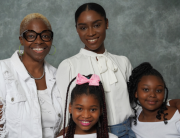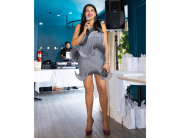Dr. Arabia Mollette is the personification of tragedy to triumph. Sitting across from this confident, charismatic emergency physician, you wouldn’t know that she experienced the traumatic deaths of her infant son and her sister; endured homelessness, poverty, domestic violence, and detractors who told her she would never amount to anything more than a teenage mother. Dr. Arabia Mollette took all that pain, tragedy and criticism and began a career serving people who have experienced much of the same. Chatting with my fellow South Bronx-native, it’s easy to imagine that she’s probably the most popular E.R. physician at her Brooklyn hospital. Her relatable and caring, yet firm and informed presence reminds you of the girlfriend you’d always want in your corner. We asked Dr. Mollette her take on a variety of topics and she answered; from the best healthy practices to implement in your daily life to the truth about the coronavirus, and if that tricky BMI chart is really accurate (*side eye*). Check out Dr. Mollette’s tips and takes, below!
Your Tragedy Can Be Your Testimony
At one point in my life—at several points in my life, my own tragic experiences had held me back. It took years of counseling, years of making mistakes, repeating the same mistakes, failing over and over again, acknowledging my own mistakes, acknowledging that I need the help, acknowledging that I do have a problem, that I have anger, acknowledging that my past is going to be with me wherever I go if I don’t address it… I always remember there was a particular story in the bible where there was a group of people in the wilderness and they were calling out for God (referring to Moses and the Israelites), and God was supplying all their needs, their food—God was showing them along the way. I always remember a part of that story, that even in the wilderness God was still showing me how to get to the next point, I just didn’t realize it at that time. And so, I failed plenty of times; I got kicked out of college, I failed exams…and when you have been faced with so many defeats already, you start to internalize it, you start to allow it to be a part of your DNA, where it’s not necessary. Because God made you who you are, He made me who I am and that’s the test of Your testimony.
But it took years for me to get to the point to get to that point to say “you know what? Enough is enough. I need to do better; I need to own up to my own mistakes, I need to not blame everyone else for my issues.”
The Truth About Coronavirus
The first thing I would like to say to everybody is that the panicking and the mass hysteria that’s going on, doesn’t really help the situation. Even though we must be careful, unfortunately there’s so much sensationalism in so many various media outlets, a lot of people don’t know what is true and what is not. The reason that it’s called novel coronavirus is because it’s a new strand of the coronavirus, it was discovered in 2019, in Wuhan, China, and then—now, as you can see, its being spread all over the world. So, the way the media has been explaining what the coronavirus is— at times it makes me really frustrated because I’m like, the coronavirus is a family of viruses and they’re subtypes of it. At least 3, or 4 of them we’ve already been exposed to, that’s why we call it the common cold. 80 percent of people that have contracted the coronavirus usually have mild symptoms, so that’s first and foremost, which is a good a thing.
And children are at least risk of developing the coronavirus than adults. There’s a theory that possibly it’s because a lot of the children are vaccinated and their immune systems are strengthened, and preventative care—seeing their pediatrician, and parents are more hands on, bringing them to the pediatrician, making sure they have annual checkups. Whereas us, as adults, we kind of fall by the wayside, not following up with our primary care physicians, not following up with vaccinations, but that’s just theory, it’s not concrete.
I will say a lot of people have hit me up on if they should wear a mask or not, and I say to them, “no, you should not be wearing a mask”. First of all, the masks that are being sold on the internet are not properly fitted, most of them are coming from China, believe it or not, and a lot of times when you wear the mask it doesn’t necessarily protect you from other people. When you wear a mask and if you’re sick, you’re protecting others from you. It only keeps the droplets in, it doesn’t keep the droplets out because the particles of the virus are so small it could still filter through the mask.
My best advice to people, as far as preventing—
Wash your hands your hands with soap and water at least for 20-30 seconds. And the reason that’s very important is because it helps kill the virus. The way the virus itself is made, which is COVID-19, the outer layer is made out of liquid fat, so when you wash your hands with soap, the soap and water kills the virus right then and there.
Also carry hand sanitizer.
Try to avoid people that are sick. Do your best.
Also, keep your skin moist. The drier your skin, the more cracks you’re going to find in your skin. So, it actually opens up barriers and opens up an entryway for microorganisms to penetrate your skin because the virus can pass through your mouth, your nose, your skin.
And if you’re sick, try to stay home. I know it’s hard for a lot of people, especially if they’re the sole provider of the household, but if you are sick, it is best if you stay home. And if you’re feeling sicker, yes, go to your nearest emergency department, but also contact your primary care physician because you might not have to go to the emergency department unless you are seriously ill.
The people who are at [high] risk are the elderly, people who are immunocompromised, such as those who are HIV positive, or have AIDS, also cancer patients, people who have asthma, COPD, those are the main ones that are at high-risk for developing the coronavirus and developing complications from it.
The BMI Chart Says I’m Obese, Am I Really?
I have a podcast, it’s called The Visit with Dr. Arabia Mollette, and so I actually did a podcast, “Fearing the Black Body: The Phobia of Fatness”. It’s based on a book by Sabrina Strings, she’s a sociologist at UCLA, and she wrote this phenomenal book called Fearing the Black Body and it’s about the Body Mass Index and how it was used in such a negative way toward black women. Even for life insurance—if you’re a certain weight, all of sudden, back then, you weren’t qualified for life insurance, and also, too—the stigmatization toward black women in terms of our curves. Look at Serena Williams—according to society, Serena Williams does not have the average tennis body. She was ostracized, she was criticized, she was humiliated numerous times by various media outlets based on her body. So, to me, I’ve never agreed with the BMI because it was always used as a racial tool to harm us in many ways. So just because you are of a certain weight, that does not mean that you’re not healthy. Not just healthcare professionals, all of us—people actually base or rate, health based on what they see from the exterior, not what’s going on, on the inside. Not to say that obesity doesn’t affect us, because it is a major risk factor, and especially for women of color, and especially black women—with breast cancers, fibroids, heart disease, including hypertension, strokes, and diabetes, weight can be a factor. And some of us may need to lose a little weight. Shoot, I know that I need to lose a little couple of pounds, but does that mean that that’s true for everybody? No. We have to talk about weight, we have to talk about obesity in our community. But also, at the same time we need to embrace different shapes and not stigmatize what a healthy person looks like or weighs.
You can find out more about Dr. Arabia Mollette, here and listen to her podcast, “The Visit with Dr. Arabia Mollette” on Soundcloud, Spotify, and iTunes.
Featured Image by Whitney Thomas







Wow! Really enjoyed this article and the perspectives shared. Well written, informative, transparent, and empowering. Thank you Dr. Mollette for your wisdom and Elizabeth Samuel for this inspiring piece. We love reading your articles.